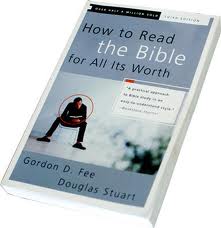When reading an ordinary textbook, a science book, a novel or some other book, people would somehow generally agree with what that particular book means — more or less. But when it comes to the Bible, a lot of confusion is usually generated and a lot of people claim that only they — or their denomination — have the correct interpretation of Scripture and all the others are wrong. Surely, God is not the author of confusion!
Pretext — Text without Context
“A text without context is pretext” so I’ve heard and I agree. This is a good reminder that if someone quotes Scripture without considering its surrounding context, then that quoted part of Scripture must have been quoted in pretext. This means that the quoted Scripture is being misused without really understanding the surrounding background behind the passage. Oftentimes, a part of Scripture is quoted with an already-formed conclusion in mind. The Scripture is only used to support a preconceived idea and it’s not really what that part of Scripture is really saying. This is called proof texting.
The Surrounding Context
One of the most important lessons — a basic lesson for students of Bible interpretation — is the matter of considering the surrounding context of that part of Scripture which is being quoted. It is a must — if we are to accurately interpret Scripture — not to lift Scripture out of its surrounding context. Let me discuss two points here: 1) the immediate context and, 2) the larger context.
Proper Interpretation — Common Sense
According to the book, “How to Read the Bible for All It’s Worth” by Fee & Stuart, a good interpretation is one that makes good sense—common sense — of the text quoted. It normally doesn’t need to be explained by other books of the Bible. It makes good sense right within its immediate context and larger context.
Immediate Context
Immediate context means that we have to check and consider one or two verses before the quoted text and also consider one or two verses after the quoted text to find out what is being talked about. In other words, check the verses immediately before and after the cited part of Scripture. Check its immediate background — immediate context. It should make good sense — common sense — to the text, within its immediate context. Oftentimes, the immediate context will help clarify the verse under discussion and there is no need to quote other books of Scripture to help explain the verse. The immediate context explains itself. It should fit. It should make sense. But we’re not done yet. We also have to consider the larger context.
The Larger Context
Considering the larger context will also help us greatly in our understanding of the text under discussion. This means that aside from checking the verses immediately before and the verses after the text in question (immediate context), we also need to go backwards several chapters and forward several chapters to get the larger context. We can broaden our search for understanding by reading the whole book if need be. That’s the larger context.
We have to remember that words and/or phrases derive its meaning depending on how it is used in a particular context in Scripture. Words do change in meaning depending on the context.
Don’t just interpret Scripture with just one verse without considering its immediate and larger contexts. This will help us become more accurate in our understanding and interpretation of Scripture. If we interpret Scripture by placing our own preconceived ideas into it, that is being dishonest and is called eisegesis. We should allow Scripture to speak for itself based on its own context (exegesis) — not our own.
Other Contexts — Background Check
Of course, we also need to check its literary context, historical context, cultural context, grammatical context and all other relevant background checks (like who the author of the book is, why did he write the book, who is the audience being addressed by the book or letter, when was it written, etc.) to arrive at a much better appreciation and interpretation of Scripture.
Who is Jesus Christ?
And lastly — this actually should be the first step — and most importantly, I have learned that in order to properly interpret Scripture, we need to consider the truth about who Jesus Christ is, the Living Word. We need to learn the truth about who God is as revealed in Jesus Christ. This should be our guiding principle in biblical interpretation. Jesus Christ should be our basis and our criterion. Jesus said that the Bible is talking about him (John 5:39). We need to consider “the whole counsel of God” if we are to interpret the Bible properly. Another way of saying it is, Jesus Christ should be our “lens” in interpreting Scripture. This truth should guide our interpretation of Scripture.
May the Lord guide you into all truth (John 16:13).
“You diligently study the Scriptures because you think that by them you possess eternal life. These are the Scriptures that testify about me, yet you refuse to come to me to have life.” (John 5:39-40)




